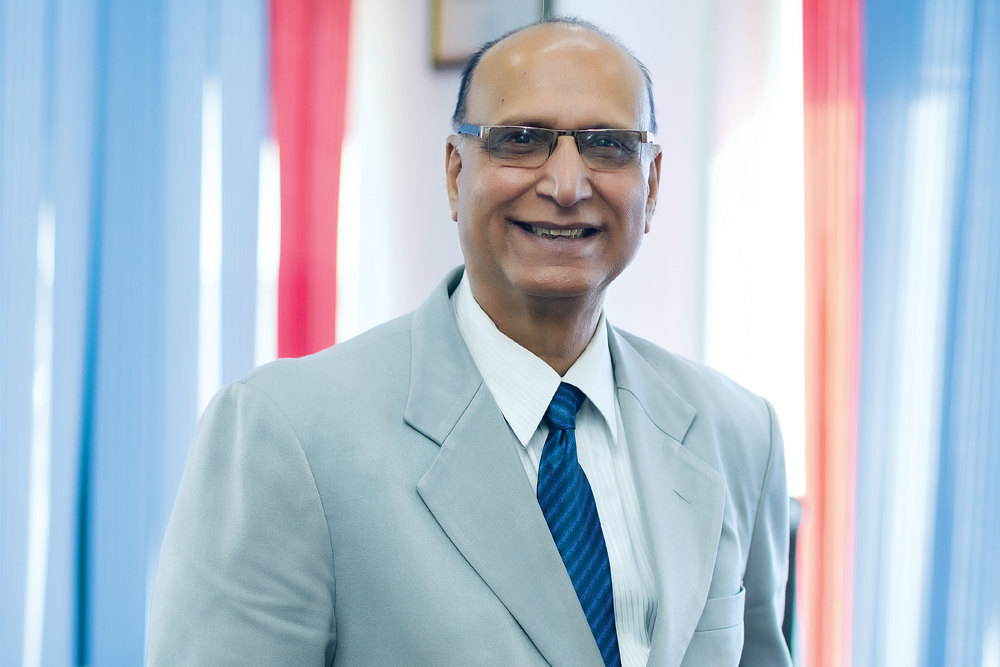
Binod Atreya is the Managing Director of Banking, Finance and Insurance Institute of Nepal. He has worked with Nepal Rastra Bank (NRB) for over three decades in various departments such as Micro Credit Promotion and Supervision, Corporate Planning, Bank Regulation, General Services, and Bankers Training Centre. He also helped develop a five-year strategic plan for NRB. After leaving the central bank, he became the CEO of Nepal Bank Ltd for three years.
Atreya also conducted supply and demand analyses for the financial inclusion roadmap of Nepal and worked as the National Project Director for the UNNATI - Access to Finance initiative, supported by the UN Capital Development Fund and the Government of Denmark.
Currently, he serves on the boards of CARE Ratings Nepal and Surya Life Insurance Company. He is also the leader of the Management Association of Nepal (MAN) International Relations Sub-Committee and a member of the Confederation of Nepalese Industries (CNI) Infrastructure, Banking, and Finance Sub-Committee. He played an active role in the early formation of Nepal Infrastructure Bank Ltd. In addition, he has been involved in various projects of the United Nations Development Programme in the Republic of Maldives, Marshall Islands, and the Republic of Palau. His areas of expertise include public-private partnership, entrepreneurship development, microfinance, strategic planning, financial literacy policy, financial sector reform, management and administration, research and training.
In this edition of Business 360, Atreya speaks about various aspects of leadership. Excerpts:
As someone who has been in various reputed positions, how do you define leadership?
A leader is someone who gets things done through their subordinates and influences them positively. Leadership is also about guiding and teaching the team to achieve the organisation’s goals and objectives. For me, leadership is always about making an impact: creating more leaders from the team, passing on the legacy, and setting a culture for future generations.
Is leadership inborn or acquired?
Leadership is a skill that you can learn and improve depending on the environment you live in. An environment that challenges your leadership can help you grow, develop and learn the qualities you need to be a good leader. For example, my team and I recently attended a conference on Nepal Banking, Financial Services and Insurance (BFSI) 2023, where we met ministers, senior government officials and ambassadors. This platform exposed us to a new knowledge system that enhanced our leadership ability. Leadership also thrives in a dynamic working environment. If you work in the same position in an organisation for a long time, your leadership quality may not be as high as those who have worked in different positions in the same organisation.
How can one win over people or create influence?
Trust is the first step to influencing and winning over your staff. Working in an office means working in a group, and you need to empower each other. When your staff feel empowered and trusted, they will do their best to make an impact and bring out the necessary changes. Today’s youth are tech savvy and want everything fast – fast promotions, fast results. We cannot change how they are groomed, but we can adjust our environment to make them more comfortable. The new generation will not enjoy traditional ways of working. Therefore, I suggest we reinvent our working modality. Finally, if you want to win over your people, give them responsibility. Set them goals and reward them occasionally, and see how they deliver the best results.
One incident that tested your leadership ability…
I have faced many leadership challenges in my career. One of them happened when I worked at NRB and had to liaise with the government, trade union and management. When I joined Nepal Bank Ltd, the non-performing asset (NPA) level was around 35% and deposits were about Rs 12 billion. It was a daunting task to lower the NPA level. I delegated some authority to the department heads and advised them to negotiate with a certain percentage and proceed with the recovery. This strategy helped me fulfil the responsibility I was assigned. By the time I left the job, the NPA level had dropped to 3%.
When should a leader pass on the baton?
Two years ago, I suffered a heart attack. I underwent surgery and spent six days in the hospital. Then I had to rest at home for another six weeks. But I didn’t stop working. I worked from home. Everyone in my family urged me to quit my job as I am getting older but I was so passionate about my work that I couldn’t quit.
Later, I visited London for work purposes. A 92-year-old speaker, in a wheelchair, said, “Professionals never retire.” That sentence made me think a lot and I decided not to step back unless I really felt it from within. Therefore, I believe there is no fixed time to pass on the baton. You can keep working as long as you have a zeal for it.
Your leadership mantra
Leadership today prepares you for leadership tomorrow. You can achieve this by giving your team full responsibility and accountability. This is what I do with my team so that they can take over my role when I am not around. If you want your team to grow, let them make decisions and do things on their own without asking you. If you always expect your team to consult you before making any decision, they will never learn. You just need to say: “Make your own decisions, learn from your mistakes, but don’t repeat them.”
What would you suggest to effectively lead a team?
Hard work is essential for success. You also need to be committed, set an example and spread positivity. For example, if you are a leader and you expect your staff to be punctual but you are always late, what kind of impression are you making? Your staff should be motivated and inspired by your work ethic. You should also foster a culture of peer-to-peer learning. Every team member has strengths and weaknesses. Leaders should help them maximise their strengths and overcome their weaknesses.
How can a leader prepare for the unknown?
Change is the only constant in this world. Every day, something happens that affects something else. You can see in the recent news, a new Covid variant has emerged. Countries like Singapore are under stress. There is geo-political instability between countries like Russia and Ukraine, supply chain disruption, financial instability, and the aftermath of Covid 19.
My point is that anything can happen, for better or worse. Therefore, leaders need to be aware of the change, anticipate the change, and think critically about the environment. They need to prepare themselves. They cannot predict the future but they can always visualise the possible scenarios and outcomes. They should calculate and plan accordingly. Those organisations that can adapt to change will always succeed. Those that are slow to respond to change will fall behind. You never know what will affect the organisation in what ways, so the organisation must be flexible and make timely decisions.
What leadership style do you follow?
My leadership style varies depending on the context. Sometimes I need to be more directive, and other times more flexible. In my work environment, I have witnessed my team members taking responsibility, which is a sign of leadership potential. I sense a strong desire among my staff to become leaders.
A leader you look up to
My father is my role model. He was a school teacher. When I was a kid, he taught me many valuable lessons that have shaped my life. He introduced me to the wonders of culture, the universe, the stars, the land, and more. I gained a lot of wisdom from the stories he shared with me. I always remember his words: “You don’t need to accomplish great things in life, just be a good human.” Those teachings have stayed with me and kept me humble.
What would you advise young emerging leaders?
The first thing they need to realise is that they all have leadership potential and they need to discover it. Secondly, they need to have self-confidence and consider their homeland before moving to another country. The respect they get in their own country is much greater. Remember, the only person who succeeds is the one who sees the positive side more often. Young people also need to learn that they should not be too indecisive and change their minds frequently. A clear mindset will help them achieve anything.



-1744698999.jpg)

-1738138700.jpg)
-1735817113.jpg)